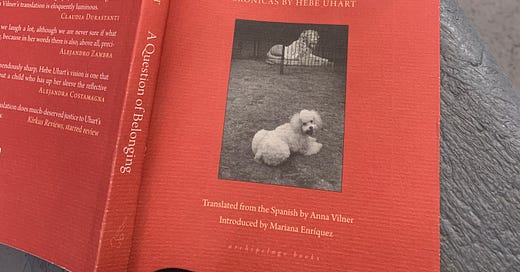the green notebook
, reading Hebe Uhart at the Jim Durrell Recreation Centre, as an east wind rolls through,
Having purchased a copy from Perfect Books on Elgin Street, I’ve been reading Hebe Uhart’s A Question of Belonging: Crónicas (2024), as translated from the Spanish by Anna Vilner. I began the introduction yesterday afternoon at the Jim Durrell Recreation Centre, as Aoife participated in a try-out for ringette, and further, this morning, during Aoife’s return to ukulele lessons at RedBird. During ringette, as Rose sat beside me in the bleachers, and read through her library copy of Kit Pearson’s historical YA novel, Whispers of War: The War of 1812 Diary of Susanna Merritt (2002), which Rose can’t stop talking about. Out of nowhere, she’ll start telling one of us, at length, some random detail about the War of 1812, reminding me, yet again, how alike the two of us are. Separately: she’s offended at any suggestion the book might not be a real and proper diary, instead of young adult fiction wrapped around historical details. How dare you, father.
I’m fascinated by the flow of Uhart’s short missives, these assembled non-fiction crónicas, offering descriptions and small details on travel, providing shine on what otherwise might simply have been overlooked. She had a fondness for small towns, clearly; a fondness for a particular local that cities can’t provide, far from the tourist vistas. There’s a way she writes through cultural commentary in an intimate way through her particular realm of creative non-fiction, putting herself directly in the action but not in the way; her presence is the prompt through which these narratives occur, remaining secondary, yet present. She is not there to interfere; she is there to seek out their stories. I can’t quite tell of her explorations are externalizing a kind of interiority, or the other way around. Perhaps there’s an element of both. “Sometimes an inherited saying dances around in your head,” she writes, to close the piece “INHERITENCE,” “one you have always hated. It’s a reminder of the past, when young people would shed their coats in the first days of spring, and their elders would say, ‘Winter isn’t done with us yet.’ You were annoyed because that comment seemed to wish for, to beckon the cold. But now you find yourself say, ‘Winter isn’t done with us yet.’”
A detail I find interesting is one that the translator mentions in her introduction, a quote from the author as part of an interview conducted by this same translator, in which the author catches her own privilege:
I was quite fickle and restless, I believed I could do things I couldn’t. I had fits of wanting to do extraordinary things. Going to the country school helped me mature. I realized that I’d had my head in the clouds, dreaming of scholarships, of travels to Paris. And I realized there were others who made sacrifices, who supported their homes. Who hitchhiked because they couldn’t afford to take the bus. I was ashamed of my own thinking, of being so self-centered. It was then when I started to ripen. Some people never ripen, not even at 40. They go on demanding things and blaming their parents.
*
With their first week of school under their belt, our young ladies seem where they’ve always been. They both, I think, appreciate a return to a routine, and both are pleased with their classes, their classmates; their teachers. They return fresh, with no recollection of summer. Aoife’s ukulele teacher, Doug, asks what she did during her break. She claims she can’t remember a thing.
A week into September, we’ve already had to pull out long sleeves, jackets.
“There’s an east wind coming all the same,” speaks Sherlock Holmes, in Sir Arthur Conan Doyle’s 1917 story “His Last Bow. The War Service of Sherlock Holmes,” “such a wind as never blew on England yet. It will be cold and bitter, Watson, and a good many of us may wither before its blast.”
This is an afternoon, for some reason, that I’m looking up information on the late Peter Sellers (1925-1980), who seemed a deeply unhappy and terrible person, and Sargon of Akkad, also known of Sargon the Great, the first ruler of the Akkadian Empire in the 24th and 23rd centuries BC. As I’m sure you already know, Sargon was identified as the first in recorded history to rule over an empire. Through Cara Waterfall’s substack, I catch a new interview with Vancouver writer Chelene Knight, surrounding mentorship and safe spaces in which to create: “My advice is to get comfortable with understanding who you are, and to get comfortable with being uncomfortable.”
I am attending my inattentions, one might suppose. I poke at small fragments of information.
Across the house, our young ladies have taken it upon themselves to fill recycling bags with stuffed toys for donation. They are filling up bags.




